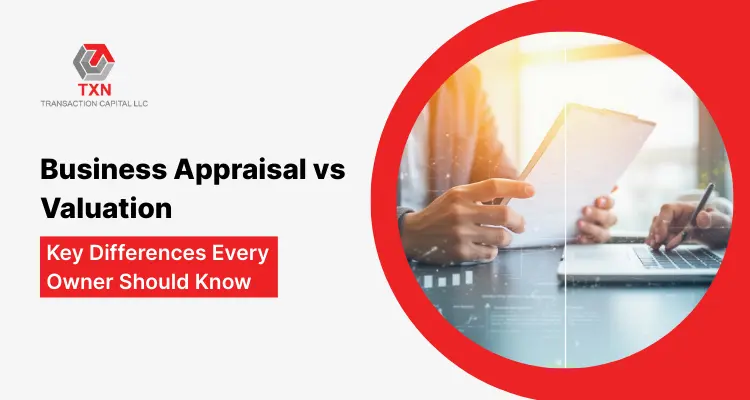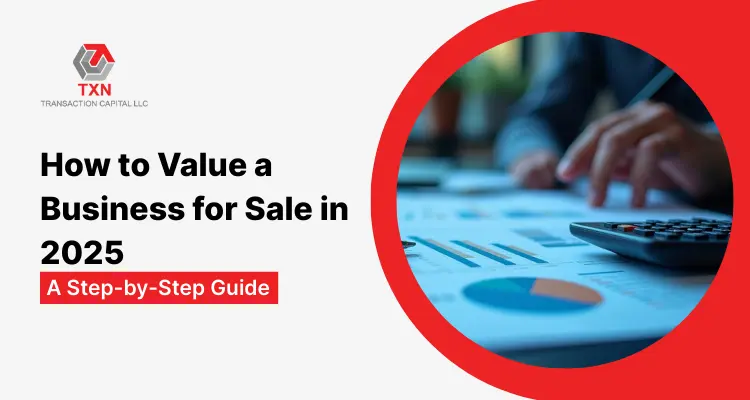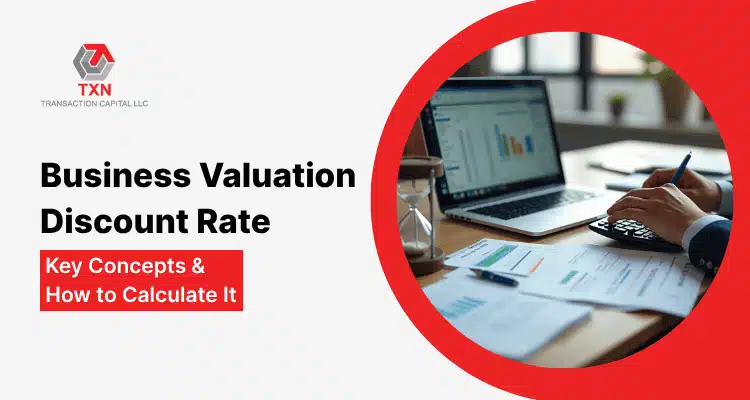Business Appraisal vs. Valuation: Key Differences Every Owner Should Know

A business appraisal provides a quick estimate for informal purposes, while a certified business valuation delivers a legally defensible assessment required for tax compliance, legal matters, and strategic decisions. Understanding this difference can save you thousands in penalties and unlock true business value.
Whether you’re planning an exit strategy, securing funding, or ensuring tax compliance, determining your company’s worth isn’t just a financial exercise—it’s a critical business strategy. Yet many entrepreneurs remain confused about a fundamental question: what’s the difference between business appraisal and valuation?
This confusion can be costly. Using the wrong assessment type for IRS filings, legal proceedings, or investor negotiations can result in audit risks, tax penalties, or missed opportunities.
What Is the Key Difference Between Business Appraisal and Valuation?
The fundamental distinction lies in purpose, methodology, and legal defensibility:
Business appraisals are informal estimates typically used for preliminary planning. They focus primarily on tangible assets and rely on simplified calculations or industry rules of thumb.
Business valuations are comprehensive, standards-compliant assessments that examine both tangible and intangible assets. They’re performed by certified professionals and can withstand legal, regulatory, and audit scrutiny.
Quick Comparison: Appraisal vs Valuation
| Feature | Business Appraisal | Certified Business Valuation |
|---|---|---|
| Use Case | Informal planning, broker listings | IRS, legal, audit, M&A, investment |
| Conducted By | Broker, consultant | Certified valuation expert (ABV®, ASA®, CVA®) |
| Legal Defensibility | No | Yes |
| Methodology | Simplified or rule-of-thumb | Standardized valuation methods |
| Assets Considered | Mostly tangible | Tangible and intangible |
| Compliance Standards | None | IRS, USPAP, NACVA, IVS |
| Report Format | Estimate or summary | Comprehensive valuation report |
Need help determining which approach is right for your business?
Schedule your consultation today →
What Is a Business Appraisal and When Do You Need One?
A business appraisal is a preliminary assessment that provides a rough estimate of company worth. Think of it as a “ballpark figure” rather than a precise measurement.
1. Key Characteristics of Business Appraisals
- Asset-focused approach: Primarily examines tangible assets like equipment, inventory, and real estate
- Rule-of-thumb methodology: Often relies on industry multiples (e.g., multiples of EBITDA or SDE)
- Simplified analysis: May rely heavily on comparable sales or industry averages
- Quick turnaround: Can be completed within days
- Limited scope: Typically excludes intangible assets and rarely adheres to standardized valuation frameworks
- Performed by non-certified professionals: Commonly conducted by brokers or advisors without formal valuation credentials
2. When Business Appraisals Are Appropriate
Business appraisals work well for:
- Initial business health checks when exploring your company’s market position
- Broker consultations before listing your business for sale
- Internal strategic planning to understand baseline value ranges
- insurance coverage assessments for asset protection purposes
- Personal knowledge when considering future exit strategies
- Exploring pricing benchmarks for potential sale discussions
3. Types of Business Appraisals
Understanding different appraisal approaches helps you choose the right method for your situation:
- Business Assets Appraisal: Focuses on determining asset book value by subtracting company liabilities from total assets. Commonly used when businesses face closure or liquidation scenarios.
- Capitalization of Earnings: Examines previously documented earnings with weighted analysis. Recent earnings receive the highest weight, while earlier earnings records are gradually reduced. More popular for established businesses with earning history.
- Future Earnings Assessment: Unlike historical earnings focus, this approach evaluates expected future profits using discount rates. Particularly useful for growth-stage companies with strong forward momentum.
- Capitalization Factor Method: Determined by dividing the required rate of return by 100, typically yielding a factor of 10. Often used for quick rule-of-thumb calculations in specific industries.
4. Benefits of Having Business Appraisals
While limited in scope compared to certified valuations, business appraisals offer several advantages for preliminary planning:
- Documentation and Structure: Provides a framework for management discussions about business performance and establishes baseline value documentation for internal files.
- Expectation Clarification: Helps clarify what stakeholders can realistically expect from the business in various scenarios, supporting annual planning and goal-setting processes.
- Quick Market Positioning: Offers rapid insights into how your business compares to industry standards and competitor positioning.
- Cost-Effective Starting Point: Provides an affordable entry point for business owners beginning to explore their company’s market value.
5. Important Use Cases for Business Appraisals
Beyond preliminary planning, appraisals serve specific purposes in various business scenarios:
- Insurance Coverage Determination: Establishing asset values for adequate insurance protection and claims support.
- Tax Liability Assessment: Preliminary estimates for tax planning purposes, though certified valuations are required for actual filings.
- Fundraising Preparation: Initial value estimates to guide early investor discussions and term sheet negotiations.
- Partnership Discussions: Baseline valuations for potential joint ventures or strategic partnerships.
- Succession Planning: Early-stage family business transition planning and estate considerations.
- Important Limitation: Appraisals cannot be used for tax filings, legal proceedings, or situations requiring IRS compliance.
What Is a Certified Business Valuation and Why Does It Matter?
The practice of business valuation traces back to the mid-1800s during the Industrial Age when larger companies began forming and required systematic approaches to determine economic worth. Today’s certified business valuation represents the evolution of these practices into a sophisticated, standards-based discipline.
A certified business valuation is a comprehensive analysis performed by credentialed professionals following established industry standards. It provides a defensible fair market value that stakeholders trust, incorporating both current market conditions and future potential.
Essential Elements of Professional Valuations
- Comprehensive asset analysis: Includes both tangible assets (equipment, real estate) and intangible assets (brand value, customer contracts, intellectual property, goodwill)
- Multiple valuation approaches: Combines income, market, and asset-based methodologies for accuracy
- Risk assessment: Analyzes company-specific and market risks affecting value
- Future potential: Considers growth prospects, market trends, and competitive positioning
Critical Situations Requiring Certified Valuations
You need a certified valuation for:
- 409A stock option pricing to maintain IRS Safe Harbor protection
- Estate and gift tax planning for wealth transfer strategies
- Merger and acquisition transactions requiring due diligence
- Shareholder disputes and buy-sell agreement triggers
- SBA loan applications and private equity funding
- ESOP implementations and employee ownership transitions
- Divorce proceedings involving business asset division
- Fairness opinions for board fiduciary responsibilities
Using the wrong valuation type can be costly!
Contact our experts now → or call +1 (917) 809-4838
Comprehensive Benefits of Professional Business Valuations
Beyond regulatory compliance, certified business valuations provide strategic advantages that directly impact your company’s success:
- Enhanced Knowledge of Company Assets: Professional valuations examine all value drivers, providing complete understanding of what makes your business valuable. This comprehensive analysis helps determine optimal insurance coverage, reinvestment priorities, and profit maximization strategies.
- Clear Understanding of Resale Value: Valuations should begin well before any sale process, allowing time to increase company worth and achieve higher selling prices. Understanding current value enables strategic improvements that maximize future exit opportunities.
- Stronger M&A Positioning: When corporations approach you about acquisitions, professional valuations demonstrate your company’s worth with credible documentation. This positioning enables better merger terms and higher acquisition values.
- Improved Investor Access: Certified valuation reports provide investors with clear, credible information about your company’s worth. This transparency facilitates investment decisions and can attract higher-quality capital partners.
- Strategic Planning Foundation: Regular valuations help business owners understand value trends, identify improvement opportunities, and make data-driven strategic decisions about growth investments and operational changes.
What Are the Different Methods of Business Valuation?
Professional valuations employ three primary approaches, often using multiple methods for comprehensive analysis:
1. Income-Based Valuation Methods
- Discounted Cash Flow (DCF): Projects future cash flows and discounts them to present value using risk-adjusted rates. Best for stable, growing businesses with predictable income streams.
- Capitalization of Earnings: Applies a capitalization rate to normalized earnings. Ideal for mature companies with consistent performance.
When it’s used: Technology companies, SaaS businesses, manufacturing firms with stable cash flows
2. Advanced Valuation Methodologies for Complex Structures
For companies with sophisticated capital structures, additional specialized methods may be required:
Option Pricing Models (OPM): Used for companies with complex capital structures involving multiple classes of securities, liquidation preferences, and participation rights.
Backsolve Method: Applied when recent financing rounds provide market evidence, working backward from transaction pricing to determine fair value.
SAFE Notes Valuations: Specialized approach for Simple Agreement for Future Equity instruments common in startup financing.
Convertible Securities Analysis: Comprehensive evaluation of convertible debt and preferred equity instruments with complex terms.
3. Market-Based Valuation Methods
Guideline Public Company Method: Compares your business to similar publicly traded companies using valuation multiples.
Guideline Transaction Method: Analyzes recent sales of comparable private companies in your industry.
When it’s used: Businesses in active M&A markets with sufficient comparable data
4. Asset-Based Valuation Methods
Adjusted Net Asset Method: Values the company based on fair market value of assets minus liabilities.
Book Value Method: Calculates net asset value by subtracting total liabilities from total assets listed on the balance sheet. Provides baseline value but may not reflect current market conditions.
Liquidation Value Method: Estimates value if assets were sold individually in an orderly liquidation process. Important for distressed situations or asset-heavy businesses.
Replacement Cost Method: Values a company based on the cost of replacing its assets at current market prices. Useful for insurance purposes and asset-intensive operations.
When it’s used: Asset-heavy businesses, companies in distress, holding companies, real estate investment firms
5. Earnings Multiple / Rule-of-Thumb Method
Commonly Applied In: Informal business appraisals, broker price opinions, and quick valuation estimates
What It Involves: Applying a standard earnings multiple (based on industry averages) to the company’s EBITDA or net income
Limitations: Often oversimplified—this method overlooks key factors such as market conditions, company-specific risks, growth potential, and intangible assets, which can lead to inaccurate or misleading valuations
How Do Intangible Assets Impact Your Business Value?
Research shows intangible assets represent 40-80% of most companies’ true value, yet business appraisals frequently overlook them entirely.
Critical Intangible Assets Often Missed in Appraisals
- Intellectual property: Patents, trademarks, copyrights, trade secrets, proprietary software
- Customer relationships: Long-term contracts, customer loyalty, recurring revenue streams
- Brand equity: Market recognition, reputation, competitive positioning
- Human capital: Key employee expertise, management systems, corporate culture
- Digital assets: Websites, databases, social media presence, online platforms
Real-World Impact Example
Consider a SaaS company generating $800K EBITDA with 20% year-over-year growth:
- Appraisal estimate: $3.2M (4x EBITDA multiple)
- Certified valuation: $3.8M (includes recurring revenue value, customer retention rates, proprietary technology, and growth potential)
The $600K difference demonstrates why comprehensive analysis matters for strategic decisions.
Who Is Qualified to Perform Business Valuations?
Not all valuation professionals are created equal. For legally defensible results, work with certified experts holding recognized credentials:
Essential Professional Designations
ABV® (Accredited in Business Valuation): American Institute of CPAs
ASA® (Accredited Senior Appraiser): American Society of Appraisers
CVA® (Certified Valuation Analyst): National Association of Certified Valuators
MRICS® (Member, Royal Institution of Chartered Surveyors): Global standard
These credentials require extensive education, experience, and ongoing professional development.
Red Flags to Avoid
Uncredentialed appraisers offering “certified” valuations
One-size-fits-all pricing without understanding your business complexity
Guaranteed value ranges before analysis begins
No professional insurance or standards compliance
When Does Legal and Regulatory Compliance Matter Most?
Using an appraisal when regulations require a certified valuation can trigger serious consequences:
IRS Compliance Requirements
409A Safe Harbor protection requires certified valuations by qualified appraisers following specific methodologies. Using appraisals can void Safe Harbor status.
Estate and gift tax filings need professional valuations to support claimed values and avoid penalties.
Section 1202 QSBS qualification often requires valuation documentation for tax benefit eligibility.
Legal and Audit Scenarios
Court proceedings only accept valuations from credentialed experts with defensible methodologies.
Financial audits by Big 4 firms require professional valuations meeting AICPA standards.
Regulatory filings like SEC disclosures need compliant valuation support.
What Documentation Do Valuation Professionals Need?
Providing complete, accurate information ensures the most reliable valuation results:
Required Financial Documents
- Last 3 years of tax returns and financial statements
- Year-to-date profit & loss and balance sheet
- Monthly financial statements showing trends
- Cash flow statements and budgets/forecasts
Business Structure Information
- Cap table and ownership structure details
- Buy-sell agreements and shareholder arrangements
- Stock option plans and equity compensation details
- Major customer and vendor contracts
Operational Details
- Industry and competitive analysis
- Key personnel and organizational charts
- Intellectual property portfolio
- Insurance policies and legal matters
Real-World Scenario: Startup Seeking Series A Funding
Situation: A tech startup needs 409A valuation for employee stock options before Series A fundraising.
Appraisal approach: Quick estimate based on revenue multiples = $5M valuation
Valuation approach: Comprehensive analysis considering:
- SaaS recurring revenue model
- Customer acquisition costs and lifetime value
- Proprietary technology and IP portfolio
- Market size and competitive advantages
- Risk factors and growth trajectory
Result: Professional valuation of $6.2M, supporting higher option strike prices and stronger investor positioning.
Impact: Proper 409A compliance protected the company from IRS challenges while optimizing employee equity incentives.
Business Appraisal vs Valuation: Making the Right Choice
Choose a Business Appraisal When:
- Exploring preliminary sale possibilities with brokers
- Conducting internal strategic planning exercises
- Assessing insurance coverage adequacy
- Seeking rough value ranges for personal knowledge
- No legal, tax, or regulatory compliance required
Choose a Certified Business Valuation When:
- Filing 409A valuations for stock option compliance
- Completing estate planning or gift tax strategies
- Negotiating M&A transactions or partnerships
- Resolving shareholder disputes or ownership changes
- Applying for SBA loans or investor funding
- Supporting legal proceedings or litigation
- Meeting audit requirements or regulatory filings
Remember: The cost difference between appraisals and professional valuations is minimal compared to the risks of using the wrong approach.
Why Timing Matters for Business Valuations
Optimal Valuation Frequency
Every 12 months for companies with active stock option plans (409A requirement)
Every 2-3 years for stable businesses without equity compensation
Before major events including:
- Fundraising rounds or investor discussions
- Ownership changes or family transitions
- Strategic acquisitions or partnerships
- Significant operational changes
Market Timing Considerations
Industry cycles affect comparable company multiples and transaction data
Economic conditions impact discount rates and risk assessments
Company milestones like new product launches or major contracts can significantly impact value
Common Valuation Mistakes That Cost Business Owners
1. Using Appraisals for Legal Requirements
- Mistake: Submitting broker estimates for 409A compliance
- Consequence: Loss of Safe Harbor protection and potential IRS penalties
- Solution: Always use certified professionals for regulatory requirements
2. Ignoring Intangible Asset Value
- Mistake: Focusing only on physical assets and financial statements
- Consequence: Undervaluing the business by 40–80% of true worth
- Solution: Comprehensive analysis including IP, customer relationships, and brand equity
3. Outdated Valuation Information
- Mistake: Using valuations over 12 months old for current decisions
- Consequence: Mispriced transactions and compliance failures
- Solution: Regular updates aligned with business changes and regulatory requirements
Industry-Specific Valuation Considerations
1. Technology and SaaS Companies
Key value drivers include recurring revenue quality, customer acquisition metrics, churn rates, and scalability potential. Standard multiples often undervalue proprietary technology and growth prospects.
2. Healthcare and Life Sciences
Regulatory compliance, intellectual property portfolios, and reimbursement dynamics significantly impact value. Professional expertise in healthcare economics is essential.
3. Manufacturing and Industrial
Asset-intensive operations require careful analysis of equipment condition, capacity utilization, and market positioning. Supply chain relationships and customer concentration affect value multiples.
4. Professional Services
Human capital, client relationships, and recurring revenue streams drive value. Succession planning and key person risk must be carefully evaluated.
Ready to Determine Your Business’s True Value?
Don’t let confusion about appraisals vs. valuations jeopardize your business objectives. Whether you need quick insights or comprehensive analysis, Transaction Capital LLC delivers professional results you can trust.
Why Choose Transaction Capital LLC?
Transaction Capital LLC stands as a premier provider of business valuation services, specializing in 409A valuations and comprehensive business assessments for companies across 35+ industries. Our certified professionals (ABV®, ASA, MRICS, CVA®) deliver audit-ready valuations that meet the highest industry standards while supporting your strategic objectives.
Professional Affiliations:
- American Institute of CPAs (AICPA)
- American Society of Appraisers (ASA)
- National Association of Certified Valuators (NACVA)
- Royal Institution of Chartered Surveyors (RICS)
Ready to protect your business with professional valuation services? Contact Transaction Capital LLC today for your free consultation.
Frequently Asked Questions: Business Appraisal vs. Valuation
1. What’s the main difference between business appraisal and valuation?
Business appraisals provide informal estimates using simplified methods, while certified business valuations deliver comprehensive, legally defensible assessments following professional standards. Appraisals focus on tangible assets; valuations include both tangible and intangible assets.
2. Can I use a business appraisal for 409A compliance?
No. IRS 409A Safe Harbor requires certified business valuations performed by qualified professionals following specific methodologies. Using an appraisal voids Safe Harbor protection and exposes your company to potential penalties.
3. How often should my business be valued?
Companies with stock option plans need annual 409A valuations. Other businesses should obtain professional valuations every 2-3 years or before major events like fundraising, ownership changes, or strategic transactions.
4. What do certified business valuations cost and how long do they take?
At Transaction Capital LLC, certified 409A valuations start at $500 and are delivered within 3-5 business days. Comprehensive business valuations for M&A or complex structures may cost more depending on scope and complexity.
5. Who can perform legally defensible business valuations?
Only professionals with recognized credentials like ABV® (AICPA), ASA® (American Society of Appraisers), CVA® (NACVA), or MRICS® can perform valuations that meet legal and regulatory standards.
6. Why do intangible assets matter in business valuations?
Intangible assets like intellectual property, customer relationships, and brand equity often represent 40-80% of a company’s total value. Appraisals typically miss these assets, significantly undervaluing the business.
7. When is an appraisal sufficient for my business needs?
An appraisal is sufficient only when no legal, tax, or investor scrutiny is expected. Use appraisals exclusively for informal planning, preliminary sale discussions, internal strategy reviews, or personal knowledge gathering where regulatory compliance is not required.



